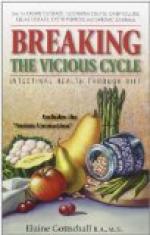WATER: The universal solvent, absolutely necessary for life.
Contained in purest form in all vegetables and fruits. The average person needs, in addition, from three to five pints taken as a drink. If not sure of the purity, boil. Do not drink while food is in the mouth.
[Sidenote: Absolutely Necessary for Growth]
VITAMINES: Health preservers. Vital substances necessary for growth. The chemistry of these products is at present not thoroughly understood, but their importance has been demonstrated by experiments (not torture) on animals. By this work we know that diseases like beri-beri, scurvy, rickets, and probably pellagra, are due to a lack of these vital elements in the food, and from that fact these are called “deficiency” diseases.
[Sidenote: Guinea Pigs vs. Babies]
Of course I realize that nations can be saved from horrible diseases, and hundreds and thousands of babies saved from death, through this experimentation on a few guinea pigs and other animals; but what is the life of a baby compared with the happiness of a guinea pig? Down with animal experimentation! Let us do everything in our power to hamper scientific work of this kind. We are giving up our husbands, fathers, sons, perhaps to die, for the cause of humanity, but a guinea pig! Horrors!
It has been found that the vitamines, like the minerals, are most abundant in the outer coverings and the germ of grains, and in fruits and vegetables. They are also present in fresh milk, butter, meat and eggs. Babies fed pasteurized or boiled milk should have fruit juices and vegetable purees early. Begin with one-half teaspoonful, well diluted, and gradually increase the feeding to an ounce or more between meals once or twice daily.
Most animal fats have the vitamines, but vegetable fats are deficient in them. That is the reason cod liver oil is better for some therapeutic uses than olive oil.
[Sidenote: Balanced Diet]
BALANCED DIET: Should contain
10-15% Protein
(children may need more)
25-30% Fat
60-65% Carbohydrates
[Sidenote: To Get the Elements Necessary for Health]
For example, suppose you are a fairly active woman and need 2500 calories per day. Then for a balanced diet you would need:
10% Protein, or
250 C.
25% Fat, or 625 C.
65% Carbohydrates 1625 C.
-------
2500 C.
250 C. of P. = 2-1/5 oz. dry
protein
(250 / 113 = 2-1/5, approximately)
625 C. of F. = 2-1/2 oz. of fat
(625 / 255 = 2-1/2, approximately)
1625 C. of CH. = 14-1/2 oz. dry carbohydrates
(1625 / 113 = 14-1/2, approximately)
Two and one-fifth ounces dry protein equals the approximate amount of protein in 10 ounces lean meat, fish, or fowl, or 9 ounces cheese, or 9 eggs. (You should not take all of your proteins in any of these single forms.) Two and one-half ounces fat equals approximately 5 pats of butter.




